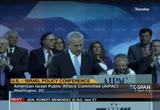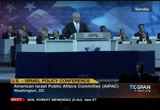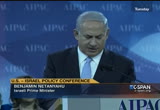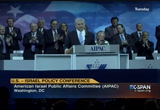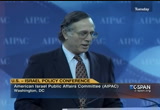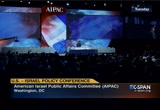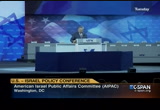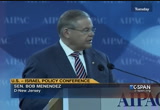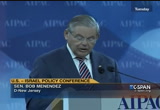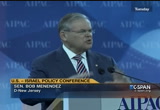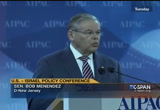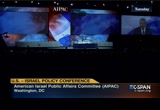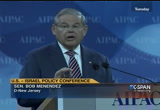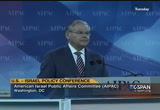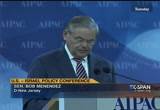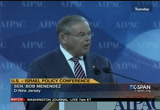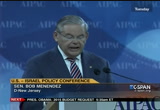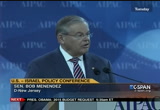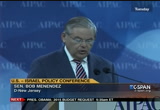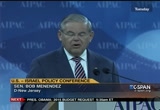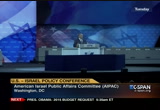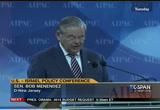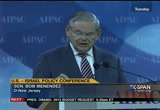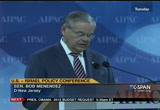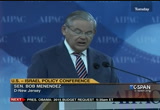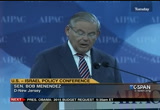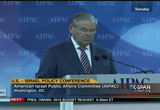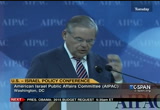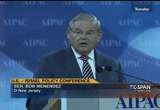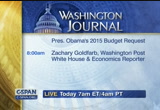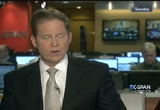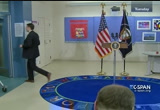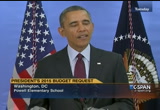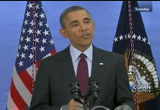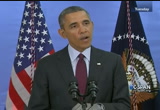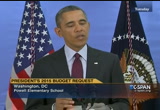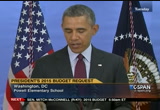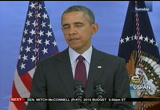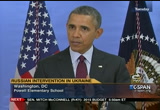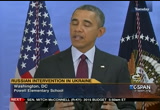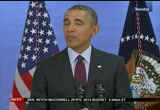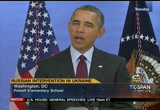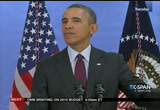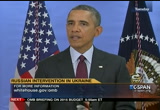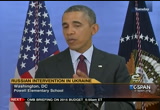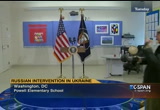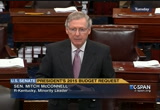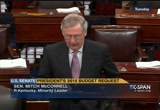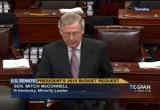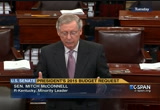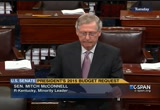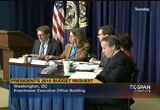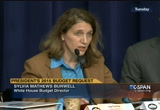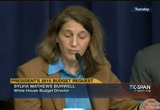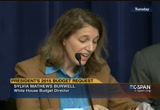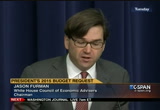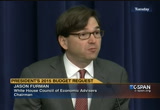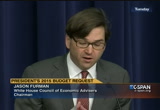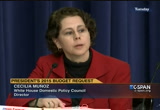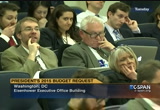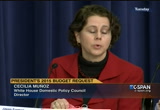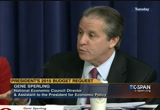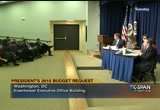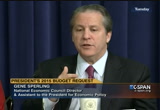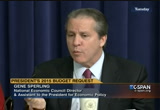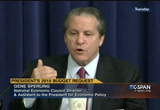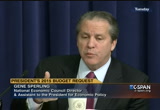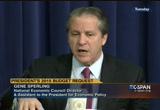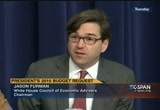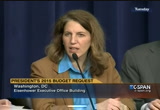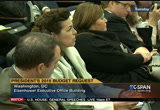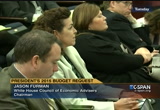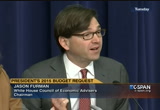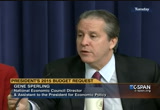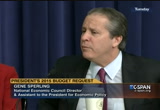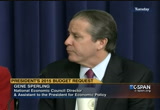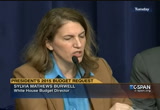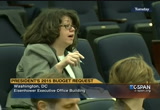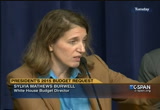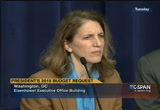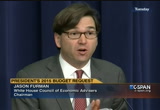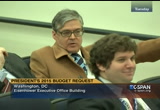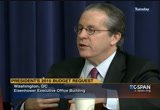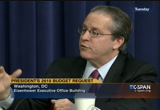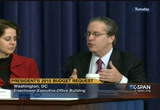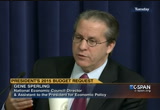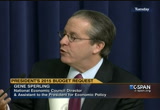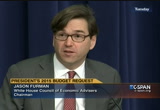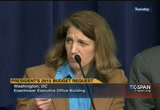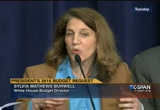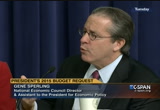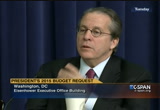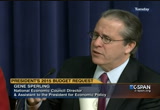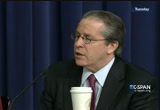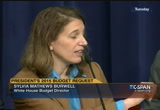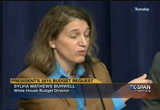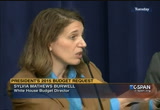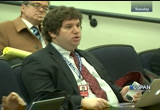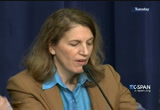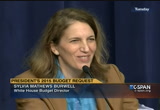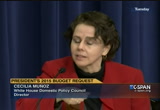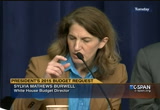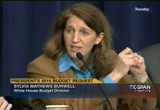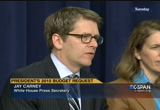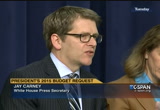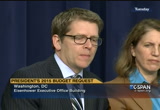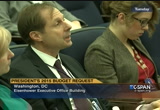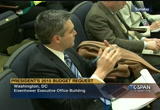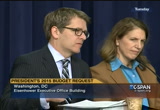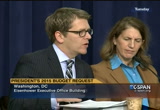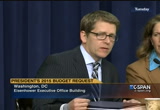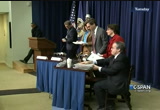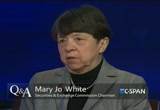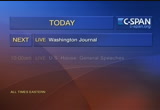tv Key Capitol Hill Hearings CSPAN March 5, 2014 5:00am-7:01am EST
5:00 am
5:01 am
scarlet, i have one thing to say to you. frankly my dear, i do give a dam. i know all of you give a damn, as do decent people everywhere who reject hypocrisy and lies and cherish integrity and truth. my friend, on behalf of the people of israel, i bring a message from jerusalem, the cradle of our modern civilization. it's a message from the bible. [speaking hebrew] i have put before you life and death, the blessing and the curse. choose life so that you and your offspring may live.
5:02 am
never forget america and israel stand for life. we stand together on the right side of the moral divide. we stand together on the right side of history, so stand tall, stand strong, stand proud. [applause] thank you, thank you, thank you. [applause] thank you. thank you. thank you very much. thank you all.
5:03 am
5:04 am
in place. he also talked about ukraine and the aid pact in word don -- being worked on by has committee. >> please welcome the former aipac president lonnie kaplan. [applause] ♪ >> this morning we are honored to welcome one of the true leaders in the united states senate. for 13 years in the house, he is the current chairman of the senate foreign relations committee, senator robert menendez. senator robert menendez has been one of america's most outspoken
5:05 am
figures on behalf of freedom around the world and on the quest to prevent a ran from acquiring nuclear weapons capability. from being the lead sponsor on legislation to delivering powerful floor speeches, the senators focus dedication, and leadership on this issue are second to none. please welcome a true champion of the united states, senator robert menendez. [applause]
5:06 am
>> [speaking spanish] >> thank you very much, and i might continue -- for those of you who are terrified i might continue in spanish, let me a lonnie kaplan -- let me thank lonnie kaplan. i it am honored to bank -- thank those i have stood shoulder by shoulder with sometimes at our own political peril. we have always stood together when it comes to the security of the state of israel, and it's
5:07 am
one of the hallmarks of this organization. i am especially honored this morning to share the stage with prime minister netanyahu, a powerful voice for a strong, secure, and democratic israel. he is the personification of a sentiment john kennedy once expressed when he said, "israel was not created in order to disappear. israel will endure and flourish. it is the child of hope in the home of the brave. it carries the shield of democracy and honors the sword of freedom. like israel, benjamin netanyahu is not created to disappear, and i know with the shield of democracy in one hand and the sword of freedom in another, he will inform and inspire us as he always has. what other reflections? i am proud to appear before aipac as the manifestation of
5:08 am
what participatory government is all about citizens petitioning their government so when some question their motives i would remind them of the first re-words of the preamble of the constitution of the united states, that we the people, and that's who you are. when i addressed this for him last year, i said israel and the united states have always agreed that israel be able to defend itself no matter what blooms from the shifting sands of the arab spring. one year later i look at the world, and i am deeply concerned. the spread of radical islamic fundamentalism from the hindu kush across the shia crescent,
5:09 am
the ark of unrest has become a long winter of discontent that threatens an entire region and threatens the worst players in the region, and it makes the outcome less predictable and increasingly dangerous for israel and the united states. israel is in an increasingly dangerous, unstable, and unpredictable neighborhood making a strategic order ship with the united states even more imperative. together we are a pillar of regional stability. together we are shining examples of democratic values and the benefits a strategically deep partnership can bring. together, israel and the united states have much more than military allies. we have collaborated on science and technology, economic issues as well as on our security, that
5:10 am
when it comes to military cooperation between our nations i am proud to continue to take our security relationship with israel to unprecedented levels from that production of rocket attacks to ensuring israel's military adage, all of us are safer and more secure because of the strategic relationship. [applause] i have led the senate foreign relations committee and finding the best way forward in the region. on syria my committee's authorization for the use of military force last september was the reason assad agreed to dismantle and destroy his regime's arsenal of chemical weapons. he decided to comply with the will of the international community only when he perceived u.s. military action should be imminent clearly demonstrating
5:11 am
our willingness to use our military power can be a force for positive change. [applause] let me say sometimes hindsight is 2020, and we may look back on that resolution as a missed opportunity to end the violence before it catastrophe vices. going forward, i think the united states must reassure its partners that we will not take the military option off the table when that force can be used to achieve clearly defined national security outlooks. at the end of the day i have led the committee in an effort to promote economic reform across the region and globally with the willingness to project the strength of our military when necessary wherever and whenever
5:12 am
democracy takes hold and people embrace the rule of law. i can assure you i will continue to lead the foreign relations committee on the dual tracks and the power embedded in the strategic partnership. both are needed if we are to protect our national security and should -- interests at home and the security of our friends around the world. excuse me for one moment. that includes the security of the ukraine. let me say russia's actions constitute a violation of international law and the quick response to support ukraine. the senate foreign relations committee is developing a bipartisan support to ukraine
5:13 am
5:14 am
ladies and gentlemen. i have worked on iran's nuclear issues for 21 years, starting when i was a member of the house, when i found out the united states was sending voluntary contributions to the international atomic energy administration, whose voluntary contributions above membership dues were going to create capacity of the nuclear facility not in the national interest of the united states not in the national interest of the state of israel. for a decade i was told my concerns had no legitimate basis , that iran would never be able to bring the plant online and that iran's nuclear activities were not a major concern. history has shown us those assessments about iran's abilities and intentions were civilly wrong man -- wrong man
5:15 am
and i believe they are wrong today. i am skeptical of iran keeping its promises. and what we should expect before we moved to an agreement that we would hope permanently dismantles iran's to clear weapon program. i support a diplomatic row gram to get us to a deal. this must be reinforced by international commitment to international regime -- to sanctions against iran. we must keep the pressure on.
5:16 am
we cannot let them opt you skate -- obvious gate -- obfuscate to make sure they never have the ability to create one nuclear bomb. i certainly will continue to do all i can to make sure we do not dismantle the sanctions regime until and unless iran dismantles their ability to create even one bomb. the international community seems to want any deal more than it wants a good deal. [applause] let's understand we need to ensure iran cannot delay sanctions while they retain the ability to resume their weapons
5:17 am
program at any time. the longer we let them delay the swifter the research and development brings new, more powerful centrifuges and the closer they get to breakout capability. it's that capability that must he dismantle. then we would have a good deal. we cannot let the international sanctions regime unravel before we have that better deal but verifiably dismantles iran's ability to produce highly enriched uranium, a deal that fully addresses the weaponization of iran's milk -- nuclear program. the problem is the mere possibility sanctions might be lifted has already brought russian business delegations to tehran. let me be clear. i support diplomatic efforts. i have always supported diplomacy and sanctions, but at the same time, i am convinced we
5:18 am
should only relieve pressure on iran in exchange for verifiable concessions that will dismantle iran's nuclear program. and that we do that in a way that sends along bells from vienna to tel aviv to washington should iran restart its program anytime in the next 20 or 30 years. i am here to say my intention as chair of the senate foreign relations committee, to make absolutely certain any deal we may reach with iran is verifiable, is affect of, and prevents them -- is defective -- effective, and prevents them from developing one nuclear weapon. based on the parameters described in the joint plan of action and all i have heard in
5:19 am
briefings and recent actions i'm very concerned. this is not a nothing ventured, nothing gained enterprise. we have placed our proven effective international sanctions online without clearly defining the parameters of what we expected a final agreement that's what we expect in a final agreement, and that's why the letters we have joined together is incredibly important, because it outlines the essence of what the final agreement that would be acceptable is. to those who believe if negotiations do not result in a deal or if iran breaks the deal, we can always impose new sanctions. let me be clear. if negotiations fail, or if iran breaks the deal, we may not have time to pass new sanctions.
5:20 am
even if iran to -- were to pass new sanctions or they do not reach an agreement that is acceptable, there will be six months to bring that online and at least a year for the real impact to be felt. this will bring us be on the short time iran would need to build a nuclear bomb especially since the interim agreement does not require them to dismantle anything. it basically freezes their capability as it stands today. let everybody understand if there is no deal i do not believe we will have sufficient time to effectively impose new sanctions before a ron could produce a nuclear weapons leaving the west with only two
5:21 am
options -- a nuclear armed iran or a military action. i believe we can prevent those being the only two options by the legislation we have proposed in a bipartisan effort to create sanctions so the iranians will put that as part of very creation. -- of their equal asian. -- of their equation. [applause] in my view iran's strategy is to use these negotiations to overhaul its nuclear program just long enough to undo the international sanctions regime. iran is insisting on keeping core elements of its program and richmond, the water reactor the underground facility, and why they may be subject to
5:22 am
safeguards so they can satisfy the international community in the short run, if they are allowed to retain their infrastructure, they could revive their program in the future. bottom line, if they get their way, they dismantle virtually nothing. the sanctions are one reason the arabians are at the table. the fact is iran is looking to lock the door on its nuclear weapons program, and should they walk away later from the deal as they have in the past, they can simply unlock the door and continue their nuclear weapons program from where they are today. if that sounds familiar, it should. it sounds a lot like north korea. let's not forget despite the somatic and treaties to the arabians in recent years were hands were extended and secret talks were pursued, iran has
5:23 am
grown support of terror. a history of terror against u.s. citizens is lengthy, robust, and grounded in the view the united states. it's funding of groups that attacks against the united states continue. 241 died in the bombing in lebanon, 19 in saudi arabia. in recent years we have traced responsibility for illegal actions against american troops in iraq and afghanistan as well as an attack on the saudi ambassador in 2011 all to a ron. -- to a ran -- to iran. today iran is spending on fighters every day. it is sponsoring attacks against sunnis in iraq and promoting
5:24 am
terrorism in a broader conflict. with all of this in mind, i believe in the wisdom of sanctions i have proposed. i believe in the lessons of history that tell us a ron -- a ran -- iran cannot be trusted to live up to its word without external pressure. the fact is iran's nuclear aspirations did not materialize overnight. make no mistake. iran is developing nuclear capability fundamental to its existence. it sees nuclear weapons as part of the strategy to make tehran the center of power or out the region. that is why our allies and partners in the region are so
5:25 am
skeptical, so concerned. while i welcome diplomatic efforts, i am deeply skeptical based upon these 21 years of experience. at a minimum, we need to send a message to iran that our patience is not unlimited and the message that sanctions regime has not weekend and this is not an opportunity to reengage with iran. it is time to put rhetoric to the test. if we are to take the president's words that iran does not seek nuclear weapons, if that is true the iranian government should not have problems with the obvious follow-up to that claim
5:26 am
starting with the dismantling of its nuclear infrastructure. that is all the sanctions legislation seeks. i did not think we should settle for anything less. do you believe we should settle for anything less? let me close by saying at the end of the day we cannot know what the future will hold. we do not know what will bloom from the shifting sands of the middle east, but what we do know , what we must understand is that the united states must be the one to step up to help protect the israeli people and counter the threat that would be poised by a nuclear iran. i have said many times the holocaust was the most sinister reminder the jewish population in exile was in constant jeopardy. it was a definitive argument and i cynicism could appear
5:27 am
anywhere, and its horrors garnered international support for the state of israel, but while that may have a central role in israel's identity it is not the reason behind its founding, and it's not the main reason for its existence. the modern establishment of the state of israel has long and deep roots going back to the times of abraham and sarah. there is no denying the jewish people a legitimate right to it -- legitimate right to live in a homeland for which they have a connection for thousands of years and that has not changed his. -- that has not changed. [applause] too often the past is truly
5:28 am
prolonged. -- prologue. next is the start of the holiday that marks the delivery of the jewish people in persia. as the story goes, a plot was hatched to destroy all jews in the persian empire, but mordecai and his adopted daughter foiled the plot, and a day of deliverance became a day of celebration. the parallel is all too obvious when it comes to the situation today in the middle east and the protection of the israeli people from the threat posed i nuclear iran.. let's pray if the time should come, together we will be like mordechai and esther, and we shall foil iran's nuclear threat and deliver the jewish people again as well as to protect the world from a nuclear threat.
5:29 am
that's our prayer, and that's what we're going to work to achieve. [applause] >> president obama introduces is 2015 budget request. mitch mcconnell responds. >> coming up, we examine the president's 2015 budget request. sec read goldfarb -- zachary goldfarb discusses the budget. you can join the conversation on facebook and twitter. >> the white house budget
5:30 am
director testifies today before the house budget committee. you can join the conversation on facebook and twitter. >> c-span, we bring public affairs events from washington directly to you. putting you in the room and offering complete gavel-to-gavel coverage of the u.s. house, all as a public service of private industry. created by the cable tv industry 35 years ago. watch us in hd, like us on facebook, and follow us on twitter. >> the headline says that obama releases a 2015 budget proposal. elizabeth the back -- elise
5:31 am
viebeck joins us. >> the budget either cut nor added substantial amounts of funds for the rollout of the affordable care act. we are seeing a rehash of what the president has previously proposed with regard to health care. he wants to make changes to medicare in order to generate savings that he can use for other priorities. >> secretary sebelius unveiling
5:32 am
the hhs budget. how is capitol hill viewing it? >> capitol hill's reaction was fairly predictable. they are looking for the budget to be cut, given that the fact that medicare and medicaid services have been spending money that congress is not completely in control of in order to shore up the problems of the rollout. in the health care world, there are a lot of health care provider groups that were upset with the obama administration which did propose to cut their budget, skilled nursing facilities and nursing homes that would see their budgets cut, in addition what is already coming to them.
5:33 am
there were some new priorities, doctors, for example training that would put new medical residents at hospitals around the country, otherwise it was a mixed bag for the health care world. >> the house will take up the bill back to the health care law dealing with the individual mandate. >> the bill from house republicans would eliminate the end of the individual mandate through the end of the year -- it would allow americans to remain uninsured through tax season. without a fine. the fine skill up in subsequent years in order to encourage people to join the health insurance pool.
5:34 am
republicans are arguing that the obama administration has given breaks to businesses that would have been required to provide health insurance to their employees. republican said that is unfair that individuals will be fined when employers will not be fined. >> the white house plans to announce further delayed some other parts of the wall. what are you hearing? >> what we expect this week is for the white house to actually allow insured companies to continue to offer plans that do not meet obamacare's minimum coverage requirements for the next couple of years. it will be a major delay for the white house, when they announced this. what it will do is allow insurance companies to continue selling policies that otherwise would have been disqualified
5:35 am
under obama's rules for minimum health-care coverage. a policy that does not have maternity care or pediatric care or mental health services included could continue to be sold. what we understand from this possible change that we expect very soon is that the white house is seeking to protect its democratic allies on capitol hill from allegations that they had previously promised that americans could keep their plans under obamacare. this is a continuing fallout from the statements that continue to haunt democrats coming up to the midterm elections. >> thank you for joining us. thank you for the update. >> president obama released his 2015 budget request on tuesday morning. the president also commented on
5:36 am
russia's intervention in ukraine. this is about 15 minutes. >> good morning, everybody. i am here at powell elementary school and just had a chance to see some of the outstanding students here. i thought it was an appropriate setting for me to say a few words about the budget i sent to congress this morning because obviously the budget is not just about numbers. it's about our values. and it's about our future. and how well we are laying the groundwork for those young children that i was with a few moments ago to be able to succeed here in america. these kids may not be the most excited people in town on budget day, but it is designed with their generation and future generations in mind. in my state of the union address, i laid out an agenda to restore opportunity for all people, to uphold the principle that no matter who you are, no matter where you started, you
5:37 am
can make it if you try, here in america. this opportunity agenda is built on four parts. more good jobs and good wages, taking sure we are training workers with the skills they need to get those good jobs. guaranteeing every child access to a world-class education. and making sure that our economy is one in which hard work is rewarded. the budget i sent congress this morning lays out how we will implement this agenda in a balanced and responsible way. it is a roadmap for creating jobs, good wages, and expanding opportunity for americans. at a time when our deficit has been cut in half, it enables us to meet our obligations to future generations without a mountain of debt. this adheres to the spending principles members of both houses and both parties agreed to. it also builds on that progress with what we are calling an opportunity, growth, and
5:38 am
security initiative, that invests in our economic priorities in a smart way that is fully paid for by making smart spending cuts and closing tax loopholes that right now only benefit the well-off and well-connected. i will give you an example. right now our tax system provides benefits to wealthy individuals who save, even after they have amassed multimillion dollar retirement accounts. by closing that loophole, we can help create jobs and grow the economy, and expand opportunity without adding a dime to the deficit. we know the country that wins the race for new technology will win the race for new jobs, so this budget creates 45 high-tech manufacturing hubs where businesses and universities will partner to turn groundbreaking research into new industries and new jobs made in america. we know, and this is part of the reason we are here today, that education has to start at the earliest possible ages. so this budget expands access to the kind of high-quality preschool and other learning programs to give all our children the same opportunities the most wonderful children we just saw are getting right here at powell.
5:39 am
we know that while not all of today's good jobs will require four-year college degree, more and more of them are going to require some form of higher education or specialized training, so this budget expands apprenticeships to connect more ready to work americans with ready to be filled jobs. and we know that future generations will continue to deal with the effects of the warming planet, so this budget proposes a smarter way to address the costs of wildfires. it includes over $1 billion in funding to help communities prepare for a changing climate today, and set up incentives to build smarter and more resilient infrastructure. we also know that the most effective and historically bipartisan ways to reduce poverty and help hardworking families pull themselves up is the earned income tax credit.
5:40 am
right now, it helps about half of all parents in america at some point in their lives. this budget gives millions more workers the opportunity to take advantage of the tax credit. and it pays for it by closing loopholes like the ones that let wealthy individuals classify themselves as a small business to avoid paying their fair share of taxes. this budget will also continue to put our fiscal house in order over the long term, not by putting the burden on folks who can least afford it, but by reforming our tax code and our immigration system and building on the progress that we made to reduce health care costs under the affordable care act. it puts our debt on a downward path as a share of our total
5:41 am
economy, which independent experts have said is a critical target for fiscal responsibility. as i said at the outset, our budget is about choices. it is about our values. as a country, we have to make a decision, if we are going to protect tax breaks for the wealthiest americans or if we're going to make smart investments necessary to create jobs, grow our economy and expand opportunity for every american. at a time when our deficits are falling at the fastest rate in 60 years, we have to decide if we are going to keep squeezing the middle class or if we're going to continue to reduce the deficits responsibly, while taking steps to grow and strengthen the middle class. the american people have made clear time and again which approach they prefer. that is the approach my budget offers. that is why i am going to fight for it this year and in the years to come as president. thank you very much, everybody. michael? >> do you have any response to president putin's press conference this morning? is chancellor merkel right that he has lost touch with reality? have you spoken to him personally? >> i have not spoken to him since i spoke to him this past weekend.
5:42 am
but obviously, me and my national security team have been watching events unfolding in ukraine very closely. i met with them again today. as many of you know, john kerry is in kiev as we speak, at my direction. he's expressing our full support for the ukrainian people. over the past several weeks, we've been working with our partners and with the i.m.f. to build international support for a package that helps to stabilize ukraine's economy. and today we announced a significant package of our own to support the ukraine's economy and to also provide them with the technical assistance they need. it includes a plan loan guarantee package of $1 billion. it provides immediate technical expertise to ukraine to repair its economy. importantly, it provides for assistance to help ukraine plan for elections that are going to be coming up very soon. as i said yesterday, it is important that congress stand with us.
5:43 am
i don't doubt the bipartisan concern that's been expressed about the situation in the ukraine. there is something immediate congress can do to help us. that is to help finance the economic package that could stabilize the economy in ukraine, help to make sure that fair and free elections take place very soon, and as a consequence helps to de-escalate the crisis. in the meantime, we are consulting with our international allies across the board. together, the international community has condemned russia's violation of the territorial integrity and sovereignty of ukraine. he have condemned their intervention in crimea. and we are calling for a de-escalation of the situation and international monitors that can go into the country right away.
5:44 am
and above all, we believe that the ukrainian people should be able to decide their own future, which is why the world should be focused on helping them stabilize the situation economically and move towards the fair and free elections that are currently scheduled to take place in may. there have been some reports that president putin is pausing for a moment, reflecting on what's happened. i think we've all seen that, from the perspective of the european union, the united states, allies like canada and japan and allies and friends and partners around the world, there is a strong belief that russia's action is violating international law. i know president putin seems to have a different set of lawyers, maybe a different set of interpretations. but i do not think that is fooling anybody. i think everybody recognizes that, although russia has
5:45 am
legitimate interests in what happens in a neighboring state that does not give it the right to use force as a means of exerting influence inside of that state. we have said that if, in fact, there is any evidence out there that russian speakers, russian natives, russian nationals are in any way being threatened, there are ways of dealing with that through international mechanisms. and we are prepared to make sure that the rights of all ukrainians are upheld. and in fact, in conversations we have had with the government in kiev, they have been more than willing to work with the international community and with russia to provide such assurances. the fact that we are still seeing soldiers out of their barracks in crimea is an indication to which what is happening there is not based on actual concern for russian nationals or russian speakers inside of ukraine, but is based
5:46 am
on russia seeking, through force, to exert influence on a neighboring country. that is not how international law is supposed to operate. i would also note just the way that some of this has been reported -- there is a suggestion somehow that the russian actions have been clever strategically. i actually think this has not been a sign of strength, but rather is a reflection that countries near russia have deep concerns and suspicions about this kind of meddling. if anything, it will push many countries further away from russia. there is the ability for ukraine to be a friend of the west and a
5:47 am
friend of russia's, as long as none of us are in ukraine, trying to meddle and intervene certainly not militarily, with decisions that properly belong to the ukrainian people. that is the principle that john kerry is going to be speaking to during his visit. i will be making additional calls today to some of our key foreign partners, and i suspect i will be doing that all week and through the weekend. as i indicated yesterday, the course of history is for people to want to be free to make their own decisions about their own futures. the international community, i think, is unified in believing that it is not the role of an outside force, where there has been no evidence of serious violence. where there's been no rationale under international law to intervene and people trying to
5:48 am
determine their own destiny. so we stand on the side of history that i think more and more people around the world deeply believe in the principle that a sovereign people, independent people, are able to make their own decisions about their own lives. mr. putin can throw a lot of words out there, but the facts on the ground indicate that right now he is not abiding by that principle. there is still the opportunity for russia to do so, working with the international community to help stabilize the situation. we have sent a clear message that we are prepared to work with anybody, if they're genuine interest is making sure that ukraine is able to govern itself. as i indicated before, something i think is not an -- has not been emphasized enough, they are currently scheduled to have
5:49 am
elections in may. everybody in the international community should be invested in making sure that the economic deterioration that's happened in the ukraine stops, but also that these elections are perceived in a fair and free way, in which all ukrainians, including russian speakers, inside of ukraine, are able to express their choice of who should lead them. if we have a strong, robust, legitimate election, there should not be any question as to whether the ukrainian people govern themselves without the kinds of outside interference we see russia exert. all right? thank you very much, everybody. [captioning performed by national captioning institute] [captions copyright national cable satellite corp. 2014] >> minority leader mitch mcconnell spoke on the senate floor tuesday criticizing the president's budget. here is a look at his remarks. >> the release of a president's budget is usually a pretty big deal, but president obama's
5:50 am
latest budget, released this morning, hadn't gotten much excitement. folks just aren't taking it seriously because it's not a very serious document. first of all, a could probably never even pass the democratic led senate and that is the point. rather than put together a constructive blueprint to get our economy moving and our fiscal house in order, the president opted for the political stunt, for a budget that is more about firing up the place than solving the most persistent, long-term challenges. it would increase taxes by well over $1 trillion in the worst economic slowdown nearly anyone
5:51 am
can remember. it would explode spending by $790 billion. forcing us to borrow more money from places like china. it would not deal with the most serious threats facing our children's futures. it does not come close to balancing this year. no wonder the president felt the left would love it. what about the middle class? what is in it for them? it seems to me like the president has given up on folks who are in the middle. he does not take their concerns and exciting as into consideration anymore. what hope sisi giving them for their medical bills? -- hopes is he giving them for their medical bills? that their wages will go up? what is in this budget except for that nagging feeling that
5:52 am
they will continue to get squeezed? this is his sixth year of trying to fix this economy, trying to tax and regulate our way of life. justices ideology demands. -- just as his ideology demands. this does not work. millions of middle-class americans continue to suffer, whether in the unemployment line or in jobs that barely allow them to get by. it is time that the president realize that doubling down on this failed policy is not going to work. it that is what this budget proposes to do. we do not need any more gimmicks. let's take a new approach, a positive strategy that focuses on helping the middle class instead of appeasing the far left.
5:53 am
the president has two years left in his presidency. it is not too late to make a positive difference for folks struggling to pay their bills. he has to let go of the left and reach out to the middle. he has to find a bipartisan solution that is worth fighting for. he will find significant support on this side of the aisle. we want to work with him to get important things done for our country. we always have. we are eager to expand opportunity for the middle class. we are eager to enact policies that will improve american jobs, the keystone pipeline, medical tax -- device tax repeal, trade legislation, just to name a few things we could do together. we are eager to find ways to control spending and put the debt on a path to elimination. we are eager to form a
5:54 am
regulatory state so that rules coming out of washington work for people other than the bureaucratic class that write them. there are bipartisan solutions to be had on these issues if only the president can put aside the politics aside for a few minutes and really work with us. the kind of unserious budget he put out today, that is just the type of silly politicking we need to get past. why would we want a budget that grows the federal government while the middle class continues to shrink? washington is doing just fine. real americans deserve a lot better. we can give it to them if we do it better. i yield the floor. >> following president obama's release of his 2015 budget request, his economic and budget advisers met reporters on
5:55 am
details of the plan. this $3.9 trillion request includes $495 billion for the defense department. >> good afternoon, everyone. thank you for being here. as you know today we have the presentation of the president's budget. for today's briefing, as part of that introduction and presentation, i have with me the director of the office of management and budget, sylvia burwell. i have jason furman, the chairman of the president's council of economic advisors. cecilia munoz, the director of the domestic policy council, and gene sperling, the director of the economic council. each of my guests will have an opening statement and then we'll take questions related to budget matters. i'll try to direct traffic in that question and answer session. i will have comments on ukraine, but if you could hold questions
5:56 am
on those subjects not related to the budget until after we're done with q&a on the budget that will be terrific. and with that i turn it over to sylvia. >> thanks, jay. the president's 2015 budget, which we released earlier today, is basically a fiscal road map for accelerating economic growth, expanding opportunity and ensuring fiscal responsibility. it includes fully paid for investments in infrastructure, job training, preschool and pro-work tax cuts. at the same time it reduces deficits and strengthens our long-term fiscal outlook. through additional health care reforms, tax reform and by fixing our broken immigration system. we recognize the importance of the bipartisan funding compromise reached by the congress and the budget shows the president's funding priorities at the 2015 spending levels that were agreed to in the deal.
5:57 am
however, we believe those are not sufficient, both in 2015 and beyond, and to ensure the nation is achieving its fullest potential. for that reason, the budget includes an opportunity, growth and security initiative that is fully paid for. it's split evenly between defense and nondefense and it presents additional investments in things like education research and manufacturing. building on the model established in ryan-murray, the initial tiff is fully paid for with a balance package of spending cuts and tax reforms, so it is deficit neutral. supporting what the president said in the state of the union the budget includes a series of measures to create jobs and accelerate growth in the economy. for example, as the administration announced last week, the budget lays out an ambitious $302 billion infrastructure proposal that's paid for with the transition revenue from pro-growth business
5:58 am
tax reform. it invests in american innovation and strengthens our manufacturing base. by supporting the president's goal of creating a national network of 47 manufacturing institutes. it supports groundbreaking research to help against disease, develop new technologies and enhances the administration's efforts. to deliver a government that's more effective, efficient and supportive of economic growth. the budget also includes measures designed to expand opportunity for all americans. for example, as gene will discuss, it doubles the maximum value of the earned income tax credit for childless workers, to build on the eitc success and encouraging people to enter the work force and reduce poverty. it invests in the president's vision of making access to high-quality preschool available to every 4-year-old and it invests in new efforts to drive greater performance and innovation in work force training.
5:59 am
to ensure the nation's long-term fiscal strength, the budget focuses on what are the primary drivers of long-term debt and deficits. particularly health care cost growth and inadequate revenues to meet the needs of our aging population. it builds on the reforms of the affordable care act with another $400 billion in health care savings, continuing to slow health care cost growth while improving the quality of health care. it curves that tax breaks that benefits the wealthiest and ensures that everyone is paying their fair share and calls for pro-growth immigration wmple reform which we know would not only promote economic growth but help with the deficit. under the president's leadership, the deficit has already been cut in half as a share of the economy. by paying for the new investments and tackling our true fiscal challenges, the budget continues our progress. reducing deficits as a share of g.d.p. to 1.6% by 2024 and with
6:00 am
regard to the issue of stabilizing our debt to g.d.p. ratio, that occurs in 2015, and then we start a declining path. the budget shows the president's vision for moving the country forward. it provides a responsible, balanced and concrete plan that can serve as a guide for congress and its work in the upcoming year. thank you. >> thank you. my role is to present the economic forecast that underpins the budget. the administration projects that economic growth will strengthen over the next several years as the economy continues to return to the full utilization of all its resources. the ongoing recovery will be aided by several factors. the overall shift of fiscal policy towards a more neutral stance, progress in household deleveraging, including gains in housing and stock market wealth and further potential for home building. this near-term recovery is consistent with c.b.o. which
6:01 am
projects a similar pace of growth over the next three years. we assume that the growth rate converges to our projected 2.3% growth rate of potential g.d.p. this, too, is generally consistent with other forecasters, coming in slightly lower than the forecast by the blue chip, in the middle of the range of the federal reserve's central tendency and slightly above c.b.o.'s longer run projection. we also project that inflation will remain low, that the unemployment rate will continue to fall over the next several years and that interest rates will rise as the economy continues its recovery. finally, i want to note that the forecast was locked in late november in order to give agencies time to prepare their budget estimate. in the 3 1/2 months since then the economy has strengthened
6:02 am
more than most forecasters expected. g.d.p. in the second half of 2013 grew at a 3.3% annual rate, exceeding the 2.3% forecasted by the blue chip at the time. moreover, the unemployment rate has fallen .6 percentage points, exceeding the decline expected by the blue chip and that is as the result of increased employment with the participation rate ticking up over that period. as a consequence, if we were doing the forecast today, we would be projecting a higher starting off point for real g.d.p. in 2014 and a lower unemployment rate in 2014. overall, however, these changes would likely have only a small impact on the medium term budget outlook. we will, of course, have a fully updated economic and budget projection in the mid session review this summer that will incorporate both the positive and negative surprises since the budget forecast was finalized.
6:03 am
and with that we'll go to cecilia. >> thank you, jason. good afternoon, everybody. it won't surprise anyone in the room to hear that for the president providing opportunity for all starts that ensuring that every child in america has access to a world class education and this budget reflects investments from the early childhood space to higher education. starting with restating the president's vision to bring high quality preschool to all 4-year-olds in this country and as a down payment on that vision, the budget includes a $500 million request which is double the amount proposed in the 2014 budget for preschool development grants to help states and cities get started in enhancing and expanding their preschool programs. the preschool initiative is paired with a $650 million initiative to support early head start partnerships that will boost the supply of infant and toddler care. this budget also proposes a new race to the top for america's schools, which is a $300 million
6:04 am
program to incentivize states to adopt a comprehensive approach on closing opportunity and achievement gaps. and the budget also includes the president's vision for high school redesign, an initiative to encourage school districts and their partners to rethink what happens in high school, prioritize innovation, project-based learning opportunities that are tied to real-world experiences. and there's a $200 million investment for what we call connect educators which is a professional development initiative tied to our connect ed initiative which is aimed at helping teachers use technology in classrooms effectively. the budget also reflects the president's vision with respect to higher education, particularly with the focus on access, affordable and -- affordability and completion. that includes pell grants, launching a competitive state performance fund to drive systemic reform across the public higher education. and also supporting innovation through a first in the world
6:05 am
program which would reward colleges and universities specifically for taking on innovative strategies to drive down the cost and drive up quality. so i know that we'll have time for questions on a range of other issues, but i want to flag one additional issue outside the education space. in is one of the elements of the president's opportunity growth and security initiative. it's an innovative piece of work. we call it the climate resilience fund. the president spoke about it in his recent trip to california. i draw your attention to it again because we take very seriously of our relationship with state, local, tribal governments who are engaged now in deliberate work to prepare and coordinate planning for the impacts of climate change. including the extreme weather conditions which many parts of the country have been experiencing. so this is a climate resilience fund. it's $1 billion investment in these efforts. it includes investing in research and unlocking data and helping communities plan and prepare and funding break through technologies and resilient infrastructure that
6:06 am
will help communities across the country better prepare for the effects of climate change. so with that let me turn to my colleague, gene sperling. i should just say this is a guy that's dedicated to his career toward fostering growth and opportunity for all americans and he will be greatly missed when he returns to his family in los angeles. >> thank you. thank you very much, cecilia. this is a program audit that creates more demand and job growth in the outset when we needed it and makes more room in the domestic smashing -- discretionary budget that invests in our future and productivity and fairness and it focuses debt reduction in the long-term where it is most important for long-term confidence. it is also pro-growth and pro-opportunity because it has very sound, evidence driven
6:07 am
initiatives that should be alive for consideration by those who want to work together for economic growth. some of the ones that cecilia just mentioned are a high school design but let me mention 3 -- as you saw, the president is putting forward another significant expansion in the earned income tax credit. the proposal that you heard discussed where we put out details yesterday would be the first major expansion of the earned income tax credit for people without -- with dependent children since 1993. it would address so many policy issues that people have raised from how to encourage younger people to encourage work, help people with disabilities get back into the workforce and ensure that more people with the combination of the earning -- earned income tax credit minimum wage do not work full-time and
6:08 am
earned poverty or raise family members in poverty. this is an important progression. 20 years ago, there were 1.4 million americans being pulled out of poverty because of the earned income tax credit or similar refundable tax credits. today it is 10 million. that is one of the major progressive achievements in which the president has furthered both in his 2009 budget and then extending those refundable tax credits in both went to 10 and 2012 for the next five years and he calls them to be permanent in his budget. this would double the earned income tax credit for childless adults. it would both increase the amount. it would keep the phase in longer so people up to $18,000 would be eligible for this. in terms of impact, 13.5 million
6:09 am
americans would benefit from this. 5.8 new million americans and 7.7 million would get a deeper earned income tax credit. let me give you one specific example -- if you were right at the poverty line for an individual, that is $11,670. under the current earned income tax credit, you would get a $239 eitc. under the present proposal you would get $974. it would be four times larger for an individual right at the poverty line. this is a concept that has i partisan support and for those who are serious about not just talking the talk but walking the walk on reducing poverty and helping low income working families, they should support the president's initiative on the earned income tax credit. secondly, the president put forward a job compromise on
6:10 am
corporate tax reform and infrastructure in which he puts out greater details here. his corporate tax reform has the same elements. it is still revenue neutral and goes to a 28% rate, 25% for manufacturing and has a minimum tax and is revenue neutral in the launcher but has $150 billion in temporary one-time revenues that come in. with the president suggests doing with that money is putting it toward the highway and transportation reauthorization $63 billion to close the existing financing gap, the hole that exists right now because the gas tax does not cover everything, plus an additional $87 billion that would allow virtually $22 billion more per year for jobs fixing things first, deferred maintenance, investments in the future. this should be the type of proposal that is alive for
6:11 am
discussion. c chairmanamp it has tax reform proposal devoted a similar amount of resources in the first 10 years to highway reauthorization. this is an idea that should be live and well. third, in addition to the proposals sicilia mentioned, the president puts forward in here on the job driven skills agenda -- the skills needed to give people the jobs that are open that they need that will be open. the proposals here are based on solid evidence and they have bipartisan support. there is a $4 billion initiative on community college innovation $2 billion on apprenticeship funds, a reemployment plan, $2 billion, for a bridge to work to make sure that while people are unemployed, they can have a chance to connect to a job and still have basic labor protections.
6:12 am
third, dislocated workers on long-term unemployment -- we do reform -- the president reforms the trade adjustment program and the existing dislocated worker program into one program that is simple and clear and reformed and accountable. in doing that, he would increase from 530,000 dollars as people for try to find a new job in a form and dollar public fund for the long-term unemployed. finally, initiatives that would give employers subsidies and help if they hire youth that are disadvantaged or people who face high unemployment rates, those native americans and those who have disadvantages and those with serious disabilities. this is a commonsense agenda. there is a lot of people talking the talk. we are for reform agenda but reform can bring forth more resources to be used well or.
6:13 am
>> we will now go to questions for our four participants today. >> jason [inaudible] two percent growth after 2013 -- [inaudible] do you agree with that? >> i would describe our forecast as broadly in the same neighborhood ascbo and the difference between the two is much smaller than the uncertainty that both cbo and the administration face in projecting future economic growth. if you look over the next three years, we are both projecting an annual average growth rate of 3.3%. after that, as you said, cbo is
6:14 am
below us in terms of potential growth rate. the blue chip forecast and their most recent long-run forecast was done in october and that is above us at 2.4% and the federal reserve is at two point two percent-2.4% and we are right in the middle so there is a range. the differences between all of those are much smaller than the uncertainty all of us face. >> [inaudible] the lending rate is at the lowest rate in 50 years. [inaudible] >> what we think is that the proposed president's budget is the right level over 10 years. we believe those levels are the correct levels. it is an argument for why the president should come as proposed, and the levels we proposed in discretionary spending and other levels are
6:15 am
the right levels. >> you list discretionary spending totals for all departments. to those totals include [inaudible] security, funds, dollars or of those not in those? >> those are not included to the totals used see in terms of departmental totals are what we would do under meeting the 15 levels of the ryan-murray agreement. >> there is a discussion about whether the affordable care act is bankable savings in health care costs over the long term. can you describe how you calculated in the budget the long-term effects of the aca health care costs in terms of deficits? >> those estimates are done by cms, working with omb so those are not estimates i have done.
6:16 am
from the analysis we have done at the council of economic advisers which is consistent with the way both cbo and the administration have updated their baselines for out your health costs has been observing that you have seen three years in a row very low health growth. if you look on a per beneficiary inflation-adjusted racist, medicare growth has been 0.0% and medicaid has actually fallen. the economy does not have a substantial impact on medicaid so some people debated whether the recession caused a slowdown. anyone would argue that that is the nature of what you have seen in medicare. it has been a combination of helices and the affordable care act that have helped reduce the costs and increase the quality as well as underlying structural changes in the health system. you have seen both the actuaries and out your projections for national health expenditures
6:17 am
cbo and the administration, all assume that all of those effects will continue and result in lower spending in the future than was originally projected. >> the cbo was projecting a deficit. how much of the health care calculations factor into that? >> the biggest difference between those two is policy. you just quote of the cbo number which assumes no policy. the president's policies would reduce the deficit by 1.8% of gdp in the last year of the budget window and as a result, the deficit would be better with deficit reduction which is what we are showing in our budget than if you did not have deficit reduction which is what a budget baseline would show. there is some other technical differences between our out your forecasts that are mostly on the revenue side come and not on the spending side. aca is the law of the land.
6:18 am
>> do any of the discussions about tax revisions vary from current law? maybe certain expired tax revisions? >> obviously, we have a set of proposals in their. one of the places that is in our -- that is assumed in our budget is that in the 2010 and 2012 budgets, the president extended his increases for the refund ability in the child tax credit the increases in the earned income tax credit for families of three children and more and the marriage penalty and one of the president's innovations was that a portion of that was also refundable. in the budget agreement, those
6:19 am
were extended for another five years through 2017. we would assume that those are extended permanently. we believe very strongly in that if those were to expire that those would be a significant tax increase in those years for well over 20 million low income working households. we obviously have a range of tax proposals in our budget. many of them have been there before. there is a couple of new ones. one way we pay for the earned income tax credit is to close a loophole where people in pass-throughs who are maturely involved to actually work there, they try to take their income as business investment as a way of avoiding payroll tax cuts. that is something that has often been proposed. that becomes a significant way to gather with carried interest
6:20 am
of paying for the earned income tax credit increase. that is a deficit neutral way that we could provide that help to 13.5 million hard-working americans and do so in a way that is revenue neutral which i think we would consider we would be closing existing loopholes as opposed to, in those cases adding any new taxes there. it includes the basic revisions the president has had the last few years which would be part of his vision of a balanced agreement and terms of reducing expenditures for high income individuals and closing loopholes for overseas tax evasion and other measures. >> [inaudible] what would you say to democrats on the hill and employees who
6:21 am
complained of the one percent pay increase is not enough and the pay raise that does not keep pace with inflation? >> i would respond with the importance of our federal employees and federal workforce and the respect the administration has for that and the recognition it has been challenging for a number of years. at omb which is a large number of career staff, we have felt that deeply. the second thing i would say is that there are provisions in previous budgets that no longer are with regard to relationship to federal employee pensions and we are pleased we can do that one percent. the last thing i would say is that the budget levels, the 14th and 15 budget levels that were agreed upon in ryan-murray, when one compares 14 to 15, they are
6:22 am
basically the same. when you account for things that have natural growth such as veterans benefits and the nondefense and -- discretionary side, you see how tight the numbers are to produce a 15 budget. we get the opportunity to do this first. the congress will do it next but people will start to know how tight the numbers are. in that context, p there areuts and takes that have to be made and we believe the federal employees were some one that deserved an increase. the one percent increase is what we thought we were able to do in the context of the budget constraints. >> did you discuss the provision for training and development for federal employees and overall efforts to reduce spending on conferences and travel? >> in terms of the relationship between the two things, the office of management and budget together withgsa and others
6:23 am
have been part of trying to reduce conference spending and that has occurred over the last several years. with regard to the issue of training and our federal workforce, it's part of thinking about how the overall government does better management. you will see articulated in the budget volumes a discussion of four major areas of emphasis that are about where we want to build on the management efforts of the first administration. those areas are in effectiveness which means serving our customers, the citizen and business as well, efficiency which means using the taxpayer dollar best, things like shared services where you will see hud using some of the services that are rest done at treasury. in terms of financial services because they are the best provider. we will do shared services. the third area is making sure that we promote management of the government that promotes economic growth.
6:24 am
that is permit thing which i think everyone knows some of the efforts. the fourth area comes to the training and that is people. it is the belief that as one thinks about an agenda for management, we need to think about how we think about helping our workforce be the best it can possibly be. there are investments that we are doing and training the federal workforce. that is how that piece fits into the broader picture. we don't consider it related to the conference part. we consider this piece of part of a broader, overall management agenda that emphasizes one of the pieces of that, focusing on the federal workforce in terms of trying to have a workforce that is able to deliver on the other three. >> can you comment on the balance between tax cuts and infrastructure jobs and that there is a report that direct jobs are four times as effective as tax cuts in creating jobs and
6:25 am
cbo reported the american jobs act would create 1.2 million jobs? why the value of task cuts versus direct infrastructure jobs? >> a lot of our focus in this budget is not on short run support for aggregate demand and the types of multipliers you are talking about that on how to best expand the productive capacity of the economy. in that respect, infrastructure is a very important investment and it is not just a one-year plan. it is four years sustained together with reforms and how that money is spent. on the revenue side, one of the most important things for growth is not something that costs any money or raise any money. it is what is neutral over the medium and long-term, reform of the business tax system that will generate money in the
6:26 am
short-term to invest in infrastructure but it will also help simplify the tax system and ensure that capital is being allocated to its highest rate of return. finally, the other revenue measures include higher revenue from households by cutting back on their tax expenditures. that is part of the balanced approach to deficit reduction that sylvia talked about to ensure that the economic plan is sustainable over the medium and long run. >> gene, as a parting gift to all of us, i wonder if you would give us your most candid assessment of when you think the next round of budget negotiations to take beyond the most recent ryan-murray agreement will take place? will it happened next year or that something for the next administration?
6:27 am
>> i think that what you see in the vision of the present budget that he has put forward -- and it goes to the question a little bit as well -- is that a lot of what is most important for growth and opportunity is not just going to be what the level of deficit reduction is that the composition of how we get there. the vision of bringing the deficit down on a sustainable pays for long-term was partly to make sure that we were not crowding out private investment. it was always designed to make sure that we also were not crowding out the public investment into the future. if you let the budget go at the levels it has with the sequester, your deficit goes down, it helps it go down, but it does so at the expense of crowding out the investments in
6:28 am
the things the president and many people believe are most critical for the future. they may not -- you may not have the greatest constituency for the people short by cancer or unknown nih investments or the families that will be better because they got early childhood education but i think what you saw inryan-murray and the president's agenda is to say that we have to have a very important discussion about what is the composition of our budget in terms of how much we continue to invest in the future and the reason why the president making the statement of putting that extra $56 billion above and fighting for that is he is recognizing that it's not just the level, it's the composition and whether that includes what has always made us great which is not just responding to the
6:29 am
constituencies of the present but investing in the young people and productivity of the future. i think we are keeping the conversation going and i think my hope is that people on both sides of the aisle will realize the importance of that going forward. i will leave it at that. >> 650 ilya and dollars in new revenue of higher taxes. -- 650 ilya and dollars in new revenue of higher taxes -- -- $650 billion in new revenue of higher taxes, who will feel that? >> in this budget, you have seen tax relief for heart pressed working families that will be continued, expanded for individuals who may not have dependence. there is a proposal to increase the dependent care credit for people who have a child five
6:30 am
years and under and make sure the american opportunity tax credit. they relief goes very much to working families. in terms of where the revenues are, they are, we think, reasonable efforts to reduce the degree of tax expenditures and loopholes for people who are the most fortunate. there is no proposal here to raise rates but i think there is a question many people have raised and tax reform on both sides which is whether a middle income family should get a 15% reduction or credit when they do things and then somebody who has significantly more income can do. three times more than that. we may think of that as being a
6:31 am
little upside down. the president's proposal to have their be a limit on tax expenditures for the most well off raises the most significant part of revenue in this raposo. the president has long proposed that. if you can remember back to the winter of 2012, the speaker of the house was suggesting one could raise almost $1 trillion through that type of tax reform. i think this will be, as always -- the president's budget will make her tax code more fair, more progressive and would do better for people who want to invest in their future and college, for people trying to get up the ladder and ask a little more from some of the most fortunate families simply because the budget, as we have discussed, is about tough choices and about how we invest in the future in a way that is also good for growth and good for productivity that ends up benefiting everyone including
6:32 am
those who might have a few less tax expenditures or tax avoidance techniques at their disposal. >> the bulk of that revenue is limiting the value to 28% which would affect though top one or two percent which is consistent with the spirit of proposal by a range of economists on both sides of the aisle including leading republican economist like glenn hubbard and marty feldstein all of whom have talked about limiting the value of tax benefits for households as a way to address the deficit. the second-biggest source of that revenue is the buffet role which is on households over $1 million per year. >> how do you drum up interest
6:33 am
during an election year? >> that question has two parts to it. there is the question of what is new in the budget and the other is how do you work to move the ball forward on a number of things. there are a number of things that are new. whether the program tax we have brought together is something new, we saw this past week him a republican bringing forth that approach. we think that is something new but indicative of bipartisan support. the eitc is something else for the childless workers that is new but something you have heard republicans discuss. that is something new and it is work based on people emphasized because it is about work. the opportunity growth and security initiative something else i would put in the new category as well. there are a number of places
6:34 am
where there are new things while we continue on the overall themes and a number of things we think are important. one thing that is also important to recognize -- what does this mean for getting something done? it's important to reflect on the on the bus. i don't think people have a lot of opportunity or chance to spend time on what happened in the omnibus. if you look at things like tiger grants an, you saw double-digit percentage increase from sequester. you saw language being put into the omnibus that would afford us the opportunity to make progress in some of the things that sicilia mentioned in terms of the state's ability to start providing preschool, universal preschool. what will happen now is this budget is in a place and we have proposed what we would do in terms of the choices at a 2015 level and now making sure that, like last year this is it
6:35 am
influences the choices that are going to be made throughout the appropriations process as well as informs the conversation and debate that i think is related to the earlier question. those are two very important things we have tried to construct a budget and will represent the president's vision for both of those things. >> some things have been in the budget that were not past but never rejected. they may not have gotten the attention that there are issues that are getting more attention now. the high school redesign proposal is making the cover of national newsmagazines. there is increasing support at the business roundtable and the business council for those proposals. while it may not have been accepted before, there may be more attention. the proposals for more job driven training -- we had the debate over ui which is not on the way we wanted that
6:36 am
we saw a lot of republicans talking for the first time about how you can connect community colleges apprenticeships, how we should do a long-term unemployment. some of these proposals, the long-term unemployment fund the $4 billion fund, $2 billion in apprenticeship -- those are new proposals in this budget. there are other things in the skills part that were never rejected but where there is a greater focus on them now. hopefully, if people are fair-minded and open, there will be greater activity there as well. >> what about the corporate tax reform? how would you see u.s. company's foreign operations in overseas investments affected by this? >> i think there is overwhelming support, i believe, for the compensation among job creators.
6:37 am
i think there is great support for the combination of a new business tax reform as well as for more infrastructure investment. infrastructure investment does not seem like the controversial issue when you hear from people who actually make decisions of where to create and locate jobs in the united states. what the president -- the presidents per pozo -- oppose all to reduce expenditures -- proposal to reduce expenditures could be as low as 25% and have a minimum tax on foreign earnings that would take away significant incentives to play the various shifting profits around the world g that goes on now and hurt publicame trust and
6:38 am
takes away a lot of activity that should be focused more on adding value and adding jobs. i think most people understand that there is provisions like accelerated depreciation, they will have higher savings and there is usually a transition adjustment that is made when you are going to a new system. i think most people understand the issue, that there are revenues that come in in the first 10 years that are not sustainable. you cannot use them to lower rates further because they are more one time but the idea of that being used for infrastructure investment which has such wide support is one that is right. it's time has come. and i think chairman camp decided to take that same approach and that should be a positive sign that this is an area, business tax reform and infrastructure, that this country should come together on. whether we do or not, i will not
6:39 am
addict, but we should. >> i would like to ask when you get to the ukraine situation. isn't there a budget question and that republicans are saying the administration should re-examine how much is allocated in the defense budget because of situation in ukraine? has the administration given consideration to that? >> let me do it from a defense budget perspective. i think it's important to reflect that there isn't it great meant that set the levels for 2015. in the president as you see proposed today, the president is suggesting the 050 account that those national security, the opportunity growth and security initiative suggests we think a better place of the to have an
6:40 am
additional $28 billion and that is fully paid for. we would make choices about offsets that have to do with closing tax loopholes. we believe that's a choice we should make. i would also reflect that in all the out years of the budget, the residents budget has higher levels of defense spending meant those that are in current law and have been supported. that is what i think we will most likely see when we see proposals as they come out. i was start from the starting point -- great, why don't we sign onto the president's budget in terms of getting our defense funding to the higher levels that we believe are appropriate? i would say as secretary hagel pointed to as well as general dempsey, give us the flexibility to do what we need to do to manage so we can make sure we modernize our force, provide the training and the readiness we
6:41 am
need and the third point they consistently make is pleased to us the certainty. the defense budget is a five-year defense planning window that has to do with how we do acquisitions of equipment it also has to do with what proportion of the entire defense budget has to do with people. giving us certainty is the other thing. my response is -- the president's budget is at higher levels. that's where we need to go and i am hopeful that we believe these are the right levels. we believe what we should be doing in the out years is buying back on that nondefense discretionary side and the defense side that we should not operate at the lower levels that are the sequester levels. as with the budget doesn't we believe that's the right ways to go. >> if i could just add -- it merits examining the logic of the republican critique that you
6:42 am
mention. on the one hand it says the president is spending too much and on the other hand, it says the cuts in defense are too deep. the spending they are criticizing goes fully have to raising the levels of our defense budget. if republicans are serious about that concern, they ought to support the initiative that would add another $26 billion to our defense budget. >> [inaudible] would you accept a proposal to justify the $26 billion? it would increase the defense side, would you accept that and not to discretionary? >> the proposed budget does with the ryan-murray budget does on a
6:43 am
one-to-one basis. we leave both are equally important. >> any others on budget related issues? [inaudible] >> the budget talks about the it [inaudible] and the problems associated with the aca roll out. what are you planning for more efficiency and effectiveness? >> let me speak to three particular areas we will focus on with regard to reforming the way we in the federal government to it procurement and delivery. the three areas where we will focus our attention are making sure the government has the best people. as a part of the conversation we have had around health care.gov
6:44 am
and how we think about procurement and planning is making sure we and the federal government are able to attract the best talent. the second is how we attract the best companies. the best companies in terms of the problems we are working on and do our current preferment rules and approaches do that? that is the second area of focus. the third area is the best processes. the best processes are about how you attract -- these are interrelated with people and companies providing these services as well as the processes. how do we think through the federal acquisition processes and the decision-making processes that can make us get to better answers? those are the three specific areas we believe focusing on -- that we will be focusing on. we are continuing to work specifically in those three areas. >> budget? >> the climate resilience fund
6:45 am
was mentioned. how does that relate to the broader climate action plan and the energy initiative? >> part of the overall effort of the climate action plan deals with the range of energy policies, things like investment in clean energy, things like moving on greenhouse s emissions and also dealing with resilience and making sure we are being a good partner to state and local hunts as they prepare for the impacts of climate change. this is a piece of that significant investment. through fema but also to include research data unlocking information that will be helpful in the process and building on our experience after superstorm sandy to make sure we are investing in the right kinds of technologies that can help water systems, for example. there are multiple pieces of that and we consider that hurt of the overall action plan
6:46 am
agenda. >> the ryan-murray deeal shows discretionary spending but your budget shows 1033 in base discretionary spending. can you explain that discrepancy? >> we build the budget to the basic 1014 levels. there are puts and takes that have different technical places like our wildfire proposal and how we do the wildfire proposal would be one of the examples when you see those numbers in the budget. that for pozo -- that proposal we believe the issue of wildfire financing in the united states is not being done in a way that is most cost efficient and
6:47 am
effective in terms of impact. on an annual basis, when the wildfire start, the department of interior and the usda end up hollowing out the type of investments we need to make in efforts in the space. they take money from other places and cannot do planning and take money from other places we should be investing. most of the time what happens is those moneys get replenished at a point in time. what we think is a better approach is to think about how we use the disaster relief fund. we want to use that fund which has levels above. the fund is above thecaps and we will use space within that for a portion of funding of wildfires. that is one of the types of things that as to those numbers. the budget is also when the appropriators look, they will be able to see how we get to those numbers. there are things like that that is within, authorized levels so
6:48 am
we are not increasing the authorized appropriations. that is part of what happens in those numbers. >> i have time for a couple of questions on other subjects. >> [indiscernible] is there active fighting in crimea? >> ukraine's territorial integrity and sovereignty must not be violated. military action taken by the russian government is inappropriate and unlawful. it is in violation of international law and the number of international obligations that the russian federation has. it is in violation of the 1994 budapest agreement. that russia signed onto.
6:49 am
the edge to that is -- the answer to that is we don't find that acceptable. i think it is worth looking at what the president said earlier today, what secretary kerry said in kiev today and what ambassador powers said yesterday at the united nations security council. the mobilization that we saw a rush undertake and the movement -- that we saw a russia undertaken the movement of troops that russia undertook the closing of roads, the surrounding of military bases in crimea was all done in response to an imaginary threat. there is no credible reporting of violence against ethnic russians in ukraine, eastern ukraine or crimea.
6:50 am
the president made clear and secretary kerry made clear ambassador power made clear that if there is an issue and there is protection that needs to be provided to ethnic russians in eastern ukraine, the proper and international lawful way to address those concerns is through international organizations, the united nations and the united states would support efforts to support efforts to provide monitors and other means of assuring the protection of the rights of ethnic russians in ukraine. to fabricate a reason to invade a country or use military mobilization along the lines we have seen with russia is not legitimate and not lawful. >> did that resident secure an
6:51 am
agreement from prime minister netanyahu to extend peace talks? it does not seem like there is a meeting of the minds there. >> we continue to work for a closely with the israelis and palestinians on a framework for negotiations. you saw what the president said prior to his meeting with the prime minister. you have seen what others including secretary kerry has said about the opportunity here to move forward, the necessity of a framework for negotiations and that effort continues. >> what is the white house interpretation of vladimir putin's comments earlier today? >> i would say that we continue to monitor the situation in crimea and the rest of ukraine very closely.
6:52 am
we stand by very strongly our support for the ukraine territorial and tech richie and it's sovereignty. we support the new ukrainian government which has been very responsible in its handling of events of the last days. as you know, secretary kerry announced a package of support that we want congress to work with us on very quickly so that we can complement imf assistance so that ukraine and the new ukrainian government can deal with the economic challenges it faces. >> i'm sure you saw president putin's forces comments. he does not believe this is aggression. >> president obama has been clear about our relationship with russia and their dealings
6:53 am
with russian government officials including president putin. we work cooperatively when it is in our interest and russia's interest, where those interests coincide to achieve national security aims for the united states accordingly. where we have disagreements, we are blunt about them. this would be one. it is a fact that russian military forces have taken over ukrainian border posts. it is a fact that russia has surrounded were taken over practically all ukrainian military facilities in crimea. it is a lot more difficult to advance a pretext or an imaginary threat or a fabricated situation and have that fabrication stand for very long in today's world.
6:54 am
it is patently obvious that the things russian officials have been saying are happening in ukraine are not happening. obviously, everyone has means to verify that. our focus is on making the point that russia has an alternative path to dealing with whatever legitimate concerns russia has about ethnic russians and russia's other interests in ukraine including crimea. we have long recognized that russia has long, do you cultural and historical ties as well as economic ties to ukraine. it is our position that while the ukrainian people may choose to further integrate with europe they can do so while still maintaining strong cultural, historical and economic ties to russia. to do both is not contradictory
6:55 am
and we urge russia to utilize the paths legally available to it through international organizations, to address the concerns they have about their interests in ethnic russians in ukraine. >> president obama says he is pausing and reflecting. >> the statements that president putin, i think that was an observation about the statements. >> does the white house plan to issue any new directives that would allow health care insurers additional time to offer plans that current -- that don't currently meet aca requirements? >> i don't have an answer to that, i would refer you to hhs. >> what about the loan guarantee package? can you expand on any further
6:56 am
commitments that the president has said about how soon that might happen? >> i don't have any conversations between the president and members of congress to report. there is ample opportunity since so many members have as big about ukraine for those they have been speaking to to ask how soon they plan to act. on a package of assistance to ukraine which would be an excellent use of their authority and time. thank you very much. [captioning performed by national captioning institute] [captions copyright national cable satellite corp. 2014] >> treasury secretary jack lew
6:57 am
goes to capitol hill today to testify on the president's $3.9 trillion budget 15 budget request. he appears before the senate finance committee at 10:30 a.m. eastern. live coverage is on c-span three and you can join the conversation on facebook and twitter. >> white house budget director cynthia -- sylvia burwell testifies today before the house budget committee live starting at 2 p.m. eastern on c-span three. you can join the conversation on facebook and twitter. >> we do not have a criminal investigation role. we have a vast enforcement role. we enforce the federal securities laws to make sure wall street abides by the rules we also write the rules for wall street and brokered dealers and investment advisers but we don't have the criminal authority. we have the power to bring, with the approval of our commission
6:58 am
civil action, civil fraud actions against those who violate the federal securities laws. we cannot send anybody to jail but we can assess civil penalties. our level of penalties is not as high as we would like it to be and there are some legislation in congress to give us an ability to assess higher penalties. we can require those who commit wrongdoing to disgorge their ill-gotten gains, the profits they make from the wrongdoing, and we have the power in the appropriate case to bar somebody from the securities industry so they cannot live another day to defraud again. >> securities and exchange commission chairman mary jo white sunday night at 8:00 on "q &a." >> the new www.c-span.org website gives you access to an incredible library of political events with more added each day through c-span's nonstop coverage of national politics,
6:59 am
history, and nonfiction books. find the daily coverage of official washington were access more than 200,000 hours of archived c-span video everything c-span has covered since 1987 and eric videos all searchable and viewable on your desktop computer, tablet, or smartphone. just look for the prominent search bar at the top of each page. the new www.c-span.org makes it easy to watch what's happening today in washington and find people and events from the past 25 years. it's the most comprehensive video library in politics. >> live today on c-span, "washington journal" examines the president what he 15 budget request. then the u.s. house returns for further speeches. then the health care law mandate. coming up, a look at the 2015
7:00 am
budget. zachary goldfarb discusses the budget and the administration's priorities and agenda for each agency. ♪ >> good morning. president obama sent congress a three point $9 trillion budget plan for 2015. a spending loophole -- blueprint that would reduce the deficit with 3.4 trillion in new revenue. sylvia burwell will be on capitol hill defending the budget. as will chuck hagel and jack lew. president obama
103 Views
IN COLLECTIONS
CSPAN Television Archive
Television Archive  Television Archive News Search Service
Television Archive News Search Service  The Chin Grimes TV News Archive
The Chin Grimes TV News Archive 
Uploaded by TV Archive on

 Live Music Archive
Live Music Archive Librivox Free Audio
Librivox Free Audio Metropolitan Museum
Metropolitan Museum Cleveland Museum of Art
Cleveland Museum of Art Internet Arcade
Internet Arcade Console Living Room
Console Living Room Books to Borrow
Books to Borrow Open Library
Open Library TV News
TV News Understanding 9/11
Understanding 9/11